Nigerian Dwarf goats are a small breed of dairy goats that originated in West Africa. They are known for their miniature size, friendly disposition, and high milk production relative to their size. Nigerians are versatile animals suitable for small farms, suburban homesteads, or as enjoyable pets. Their manageable size and friendly nature make them a popular choice for goat enthusiasts.
Small in size, great for dairy
Small in stature, does typically stand about 17 to 21 inches tall at the shoulder, and bucks slightly larger. They usually weigh up to 100 pounds. They come in a variety of colors and patterns. Common coat colors include black, chocolate, gold, and cream. They can also have various markings and patterns such as moon spots, stripes, and roaning.
Despite their small size, Nigerian Dwarf goats are excellent dairy producers. They have a high butterfat content in their milk, making it suitable for cheese and soap production. On average, a Nigerian Dwarf doe can produce over a quart of milk per day.
Nigerian Dwarf goats are known for their friendly and sociable nature. They are often kept as pets or companion animals because of their gentle disposition. They can also be easily trained, making them suitable for various purposes, including 4-H projects and educational programs. With proper care, Nigerian Dwarf goats can live up to 12 to 14 years or even longer. These goats are capable of breeding year-round, and they often have multiple kids (baby goats) per kidding. The gestation period is approximately 145 to 150 days. They are prone to common goat health issues, such as parasites and hoof problems. With regular veterinary care, vaccinations, and proper nutrition Nigerian Dwarfs are relatively easy to keep healthy.
- Pasture and forest vegetation including vines, leaves, tree nuts and fruit
- Hay
- Alfalfa
- Fruit and vegetables year round, pumpkin and squash in the fall
- Supplemental mixture of commercial goat feeds
- Multicolored, white, cinnamon, tan, black with spots
- Horned or naturally hornless (we do not disbud our goats)
- Smaller goat with a shy to playful temperament
- Adults are less than 100 pounds
- Great tolerance to the Florida weather except rain
- 1 doe can produce up to 95 gallons of milk per year
- Milk is high in butterfat and protein
- Excellent ice cream, cheese, butter and rich ingredient in desserts
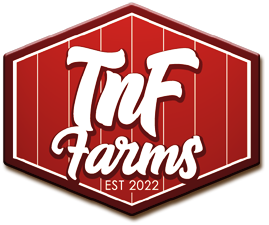
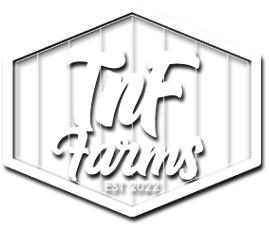
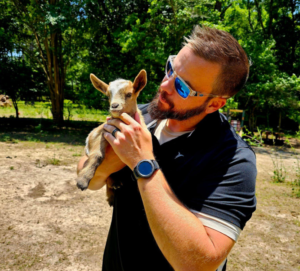
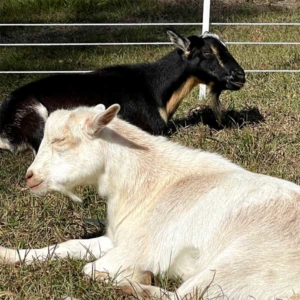
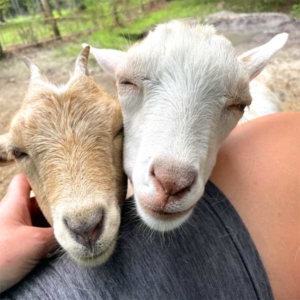
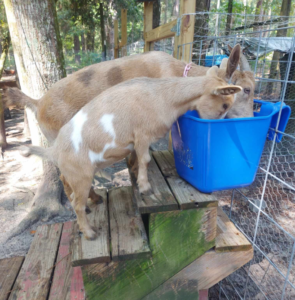
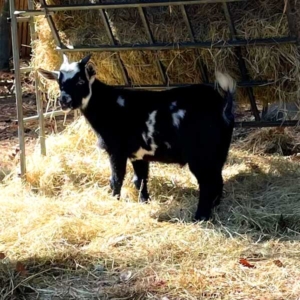
Farm Animals Make Life Better
/in American Guinea Hogs, Farm Animals, Florida Living, Nigerian Dwarf Goats, Nubian Goats, Poultry/by KaitlynI am a frequent visitor to TnF Farms, usually about once a month for a few days. I have been visiting the last few years since Tim and Faith moved to Tallahassee to start their farm. I am no stranger to farm life, as I have had horses growing up, and I much prefer it over city living. During my visits, I help Faith with farm chores, lend a helping hand on projects, become a goat midwife, and get my much-needed farm fix. I have always had a deep connection with animals in general, but there’s just something inherently special about farm animals.
Goat Friendly Florida Trees
/in Farm Animals, Florida Living, Homesteading, Nigerian Dwarf Goats, Nubian Goats/by FaithFlorida’s diverse and warm climate provides an excellent opportunity for goat farmers to integrate fruit trees into their farms. When selecting fruit trees for a goat farm in Florida, it’s essential to consider not only the climate but also the nutritional benefits these trees can offer to the goats. Here’s a more in-depth look at some suitable fruit trees:
Should You Grow Ryegrass?
/in American Guinea Hogs, Farm Animals, Homesteading, Nigerian Dwarf Goats, Nubian Goats, Poultry/by TimBeyond its role as a forage crop, rye grass plays a crucial role in environmental conservation. Its ability to prevent soil erosion, particularly on slopes or vulnerable terrain, has made it a preferred choice for cover cropping. As a cover crop, ryegrass forms a protective layer over the soil, reducing the risk of erosion and promoting soil health. Additionally, its quick growth makes it an effective ground cover in lawns and pastures, providing an aesthetically pleasing green carpet. Whether utilized for livestock feed, erosion control, or ornamental landscaping, ryegrass stands out as a resilient and adaptable grass species with multifaceted benefits.